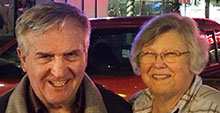By Nella Letizia, WSU Libraries
 PULLMAN, Wash. – With a combined 65 years of service to Washington State University Libraries, husband and wife Lou and Kay Vyhnanek will retire Friday, Dec. 19. A reception will be 3-5 p.m. Thursday, Dec. 18, in Terrell Library atrium.
PULLMAN, Wash. – With a combined 65 years of service to Washington State University Libraries, husband and wife Lou and Kay Vyhnanek will retire Friday, Dec. 19. A reception will be 3-5 p.m. Thursday, Dec. 18, in Terrell Library atrium.
At WSU’s 10th annual Employee Recognition Reception last week, the couple joined more than 560 staff and faculty celebrating a length-of-service milestone in 2014 – hers for 35 years, his for 30.
“We appreciate and recognize their many contributions to the libraries, to WSU and to the profession,” said libraries dean Jay Starratt. “Kay helped the libraries broaden access to scholarly research through her work on the WSU Research Exchange, a digital repository for WSU research.
“Lou forged strong relationships within WSU’s Department of History as an associated professional historian and liaison librarian, instructing generations of WSU students in the process,” Starratt said. “Both also devoted considerable time and effort to the American Library Association, particularly its Reference and User Services Association.”
Creating access to WSU research
Kay began work in 1979 as a reference librarian in Owen Science Library. Two years later, she headed the interlibrary loans department; she added circulation management in 1985. In the next decade, she took on responsibility for microforms, journals and extended campus library services. Since 2005, she has served as scholarly communication librarian.

“Kay is the first person to hold that position at WSU; it was new with her,” said Mary Gilles, business and economics librarian. “She has built scholarly communication from the ground up. Kay is also very knowledgeable about copyright and generously shares her knowledge with the rest of us.”
She put this knowledge to good use on the WSU Research Exchange, created in 2004 to give researchers access to unpublished or inaccessible materials and to open the way for additional publication opportunities and future collaboration.
“This is especially beneficial in my field of archaeology, which is very rich in detailed descriptions of archaeological sites and in tabulations of artifacts and ecological specimens from excavations or surface surveys,” said anthropology professor emeritus Bill Lipe. “Many of these unpublished reports represent all that is known about these sites, and for sites that have been destroyed by, say, highway or reservoir construction, they represent all that will ever be known about them.”

Lipe personally contributed 65 items on the Cedar Mesa Project (CMP), a regional survey and excavation in southeastern Utah that he co-directed with R.G. Matson at the University of British Columbia. Initial field work was conducted in the 1970s, but Matson, Lipe and students from both universities continue to study the archaeology of the area.
Data from the project have supported a number of theses and dissertations at WSU and several other universities, Lipe said. Most were written before such documents were regularly made available in digital form, but they have been made available on the research exchange. Articles, book chapters and theses that reference research exchange materials continue to appear, and several more publications are in the pipeline.
“Kay has been a cooperative and cheerful partner as we have built the CMP archive,” Lipe said. “Many of the reports are massive. For some, we were not able to furnish PDFs, but Kay was able to find assistance in the library to have them scanned so they could be posted.”
History librarian extraordinaire
Lou has served as history librarian at WSU Libraries during his career, creating resource guides on the histories of countries on six continents. He co-authored a book, “Reference Sources in History: An Introductory Guide,” in 1990; a second edition was published in 2004.
His appointment as an associated professional historian in the history department is unique in the library world.
“Only a few librarians have been honored with that type of appointment in a teaching department,” Gilles said.
“He’s a whiz at government documents,” added Marilyn von Seggern, government information librarian, “and he has taught many, many classes in the history department on public documents and public history.”

One history professor who benefited from Lou’s knowledge was LeRoy Ashby, co-author of the book, “Fighting the Odds: The Life of Senator Frank Church,” published in 1994. Lou proved invaluable when Ashby was researching the biography of the late Idaho senator who served 1957-81.
“I was having difficulty locating a set of sources,” said Ashby, who retired in 2008. “Lou spent several hours with me going through a labyrinthine bureaucratic maze to unearth public laws, government source books, legislative histories and other documents.”
“I always appreciated his friendly, congenial disposition as well as his understanding and respect for scholarly research and writing,” Ashby said. “Any time I asked Lou for assistance, he provided it quickly and in ways that reflected his considerable library expertise and his value as a colleague.”
Since 2002, Lou has also served as humanities and social sciences collection manager, responsible for evaluating and coordinating all activities associated with building and maintaining collections in those fields.
Despite having to make painful cuts to serial publications as budgets for the journals dwindled, “Lou has been an excellent leader for collections in the social sciences and humanities,” Gilles said. “He is fair, balanced and very knowledgeable about trends in collection development nationally.”